Progress is possible
Our goal is to help your child to develop so that they are able to comfortably adapt to their environment and develop a better quality of movement and function. Depending on the child that may mean learning to walk, to crawl, to communicate, gain relief from pain or achieve better performance in school.
The Feldenkrais approach to working with children with special needs was pioneered by Dr Moshe Feldenkrais and further developed by Anat Baniel into the Anat Baniel Method for Children. The aim is to encourage and increase your child’s ability to move and function as effectively as possible so that progress is made.
More normal movements cannot be obtained if your child stays in a few positions and moves in a limited or disordered way. An able-bodied child can move about to explore their environment. At first they focus on themselves; they kick and then bring their toes to their mouth, they play with their hands and fingers; they finger their food and handle objects, bringing them to their mouth. Without much help, and quite naturally, they move from one stage of development to another. Each new experience prepares the way for the next until ultimately they can do the more complex tasks that are required of them as they grow up.
The child with special needs also grows and develops, but the pattern of growth and development is sometimes delayed or stuck at certain stages. The brain controls all movement, so that when some part of the brain is damaged, as in cerebral palsy for example, control is reduced resulting in movement and functional issues. By reproducing the way that a healthy child explores, children with special needs can learn new movements.
Each child is different from another and has to learn according to their situation. A child may be able to move their lower limbs more easily than their upper, or vice versa. This will interfere with their development. Sometimes many stages of movement development are missing altogether. Two examples of this are:
- A child cannot lie on his tummy, lift his head up, or support himself with his arms so he will not learn to use the muscles of his neck and his back which he needs for sitting up straight or standing up. This may also interfere with the control of breathing and speech.
- A child can stand up only by stiffening her legs she will tend to stand on her toes and in time her legs will become even stiffer.
Many factors need to be kept in mind when working with a child. We need to look ahead to see what are the most essential movements and functions and work to attain them. We will help your child explore developmental movements that, up until now, they may not have experienced. Each child, whatever the severity or type of problem, will experience a variety of gentle movements and novel positions that allow their brain to learn new ways to move and function by forming new neural connections and patterns.
We would love to talk to you so please contact us if you’d like to know more.


